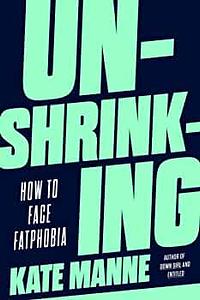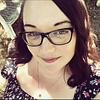Take a photo of a barcode or cover
This book is a great source for anyone looking to unlearn diet culture and learn how to combat fatphobia! the author does a great job of breaking down how and why our society is fatphobic. If you have read a lot of anti diet/fat acceptance books, there is not anything radically new in this one, but I did appreciate Kate's perspectives on things!
challenging
informative
reflective
medium-paced
informative
inspiring
informative
reflective
slow-paced
i have a lot of thoughts on this book and i agree with a lot of what is argued in it. however, points taken off for arguments that i think couldve been better made and evidence that isnt quite as conclusive as the author seems to think.
also, its written very much from the perspective of the author herself who admittedly is new to her own body reflexivity journey and its like ok then either 1) write a memoir or 2) dont act like an authority on something youre still very much in the middle of. it just makes me question a lot of the conclusions the author comes to because its like okay but what about later down the line? it just feels like shes too close to it and doesnt quite have her own perspective ironed out yet.
i feel like the book can be summed up as an exploration of fatphobia as an agent of misogyny which is extremely interesting and was a compelling read to me but also i dont think thats exactly what the author thought she was doing. it felt a lot more like she was parroting what other writers have already said without really realizing that what she herself was saying was "its misogyny all the way down"
also, its written very much from the perspective of the author herself who admittedly is new to her own body reflexivity journey and its like ok then either 1) write a memoir or 2) dont act like an authority on something youre still very much in the middle of. it just makes me question a lot of the conclusions the author comes to because its like okay but what about later down the line? it just feels like shes too close to it and doesnt quite have her own perspective ironed out yet.
i feel like the book can be summed up as an exploration of fatphobia as an agent of misogyny which is extremely interesting and was a compelling read to me but also i dont think thats exactly what the author thought she was doing. it felt a lot more like she was parroting what other writers have already said without really realizing that what she herself was saying was "its misogyny all the way down"
informative
reflective
medium-paced
challenging
dark
emotional
informative
reflective
medium-paced
slow-paced
informative
medium-paced
How this book ended up on my TBR: One of my newsletters, likely Virginia Sole-Smith's, included an interview with the author. I added it to my Libro TBR and then promptly forgot about it. Meanwhile, I read and very much liked her Entitled: How Male Privilege Hurts Women and did not give Down Girl a proper try (was not in the mood for the more academic version of Entitled). I very much like this author's work and was surprised to see this book.
I've read quite a lot of material lately about fatphobia (with special mention of Aubrey Gordon, Virginia Sole-Smith, and Roxane Gay; all of these writers are referenced in this work). If you are new to the concept of fatphobia, this is a great place to start. If you are NOT new to the concept of fatphobia, I would argue that while this book covers a lot of the necessary bases that you can find in other works, Manne does a great job of connecting the concept of gaslighting to diet culture and fatphobia. She does briefly touch on fatphobia's start with racism (against black women), so she's hitting all the necessary components.
The book is personal to Manne in many ways. She has historically felt judgment in her role as a scholar (and she comments more directly about racism and sexism in philosophy departments, so that's kind of interesting). It was hard to hear her talk about avoiding pictures and tours after publishing her first two books because she didn't want to be judged based on her body and appearance. I know I used to avoid taking pictures, and I don't always love them now, but I love making memories and being able to remember being with the people I love.
Manne's approach is unique in that she also focuses on health, especially implicit bias in the medical field (something you can also read a whole lot about in Ilana Jacqueline's work, especially her book entitled Medical Gaslighting). In addition to writing about how often fat people get misdiagnosed (sometimes to incredibly awful results), she spends a bit of time on fat people trying to get pregnant or who are transgender and want to get surgery.
Manne's intent with this book was sort of unclear to me. She did mention near the beginning that this was not meant to be a transformative book for individuals who are experiencing fatphobia. It seemed to be something targeted toward fatphobic systems, but I'm not sure it made any particular point. You could argue that her whole point is a new politics of "body reflexivity" (which I do like over body positivity). In combination with the chapter about gaslighting and diet culture, Manne addresses topics such as gastric bypass surgery and weight loss medicine. I think it's fair to criticize both of these topics, especially since we don't know the long-term health impacts and there appears to be some significant issues with both. But Manne further argues that, even if there were no short-term or long-term effects, we still shouldn't need them. We should instead appreciate the diversity of body sizes instead of saying that fat bodies need to be fixed. I don't think she's wrong. I suppose I wish that she had also included that some people (myself included) use these options because we are exhausted by the effects of fatphobia.
This was absolutely worth the time, and I highly encourage anyone interested in learning more about fatphobia to read this book. I was delighted to see that Manne also narrates this audiobook, and she did a great job.
I've read quite a lot of material lately about fatphobia (with special mention of Aubrey Gordon, Virginia Sole-Smith, and Roxane Gay; all of these writers are referenced in this work). If you are new to the concept of fatphobia, this is a great place to start. If you are NOT new to the concept of fatphobia, I would argue that while this book covers a lot of the necessary bases that you can find in other works, Manne does a great job of connecting the concept of gaslighting to diet culture and fatphobia. She does briefly touch on fatphobia's start with racism (against black women), so she's hitting all the necessary components.
The book is personal to Manne in many ways. She has historically felt judgment in her role as a scholar (and she comments more directly about racism and sexism in philosophy departments, so that's kind of interesting). It was hard to hear her talk about avoiding pictures and tours after publishing her first two books because she didn't want to be judged based on her body and appearance. I know I used to avoid taking pictures, and I don't always love them now, but I love making memories and being able to remember being with the people I love.
Manne's approach is unique in that she also focuses on health, especially implicit bias in the medical field (something you can also read a whole lot about in Ilana Jacqueline's work, especially her book entitled Medical Gaslighting). In addition to writing about how often fat people get misdiagnosed (sometimes to incredibly awful results), she spends a bit of time on fat people trying to get pregnant or who are transgender and want to get surgery.
Manne's intent with this book was sort of unclear to me. She did mention near the beginning that this was not meant to be a transformative book for individuals who are experiencing fatphobia. It seemed to be something targeted toward fatphobic systems, but I'm not sure it made any particular point. You could argue that her whole point is a new politics of "body reflexivity" (which I do like over body positivity). In combination with the chapter about gaslighting and diet culture, Manne addresses topics such as gastric bypass surgery and weight loss medicine. I think it's fair to criticize both of these topics, especially since we don't know the long-term health impacts and there appears to be some significant issues with both. But Manne further argues that, even if there were no short-term or long-term effects, we still shouldn't need them. We should instead appreciate the diversity of body sizes instead of saying that fat bodies need to be fixed. I don't think she's wrong. I suppose I wish that she had also included that some people (myself included) use these options because we are exhausted by the effects of fatphobia.
This was absolutely worth the time, and I highly encourage anyone interested in learning more about fatphobia to read this book. I was delighted to see that Manne also narrates this audiobook, and she did a great job.
funny
informative
sad
slow-paced
informative
reflective
slow-paced
Thought provoking insights into fat-phobia in our culture




